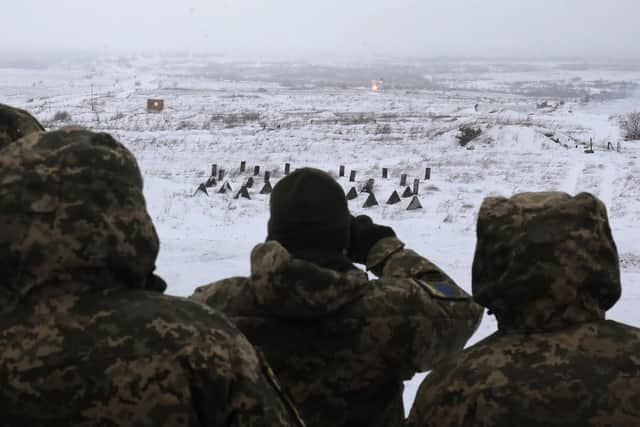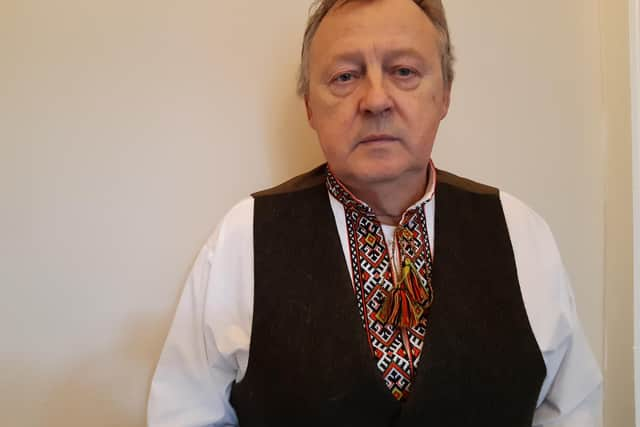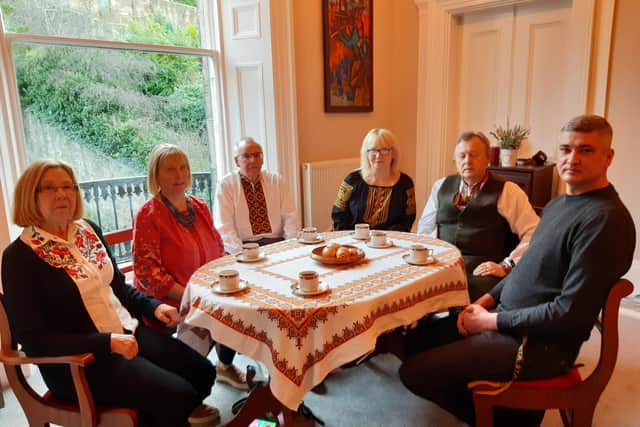'We just want peace' say members of Edinburgh's Ukrainian Club
and live on Freeview channel 276
"Peace,” says club member Linda Antoniuk. “That’s all.”
“We always say just leave us alone,” adds Ivan Babuscsak. “We want [President Putin] to just leave us alone.”
In the drawing room of a Georgian townhouse in Edinburgh’s Hillside district, the club is discussing the political situation in Ukraine, where Russian troops are lined up along the Belarusian border and president Vladimir Putin is embroiled in a war of words with the West. The room is decorated with Ukrainian trinkets, maps and books - and the table is set for tea on a traditional embroidered tablecloth.


Advertisement
Hide AdAdvertisement
Hide AdNone of the club members – bar caretaker Mr Babuscsak, who moved to Scotland six years ago and lives in a flat on the premises – was born in Ukraine. Their fathers were all Ukrainian prisoners of war brought to Scotland at the end of the Second World War, who, on their release, remained, many of them marrying local women.
“We were born in Scotland, we are proud Scots, but we also feel Ukrainian,” says Ms Antoniuk. “We have Ukrainian blood in our veins.”
She adds: “This is more than just a beautiful building to us – our fathers worked hard to get it and it was special. We were brought up in Scotland as young kids with unpronounceable names and this was a place where we learned about our culture.”
Many members of the group still have family in Ukraine, where they were regular visitors before the pandemic. The Edinburgh club, the only remaining club of its kind in Scotland, was set up by the current members’ fathers more than 50 years ago, as a way to retain their Ukrainian heritage.


Advertisement
Hide AdAdvertisement
Hide Ad“They wanted to go home, but they couldn’t because of the Soviet system,” explains Ms Antoniuk. “They were homesick and wanted to have a little bit of Ukraine here, so that's why there's Ukrainian clubs. We grew up doing all of the cultural things, some of us have known each other since we were children.”
Now the group fear for the country they regard as their second homeland. Tensions have increased in recent weeks amid fears that Mr Putin could be considering an invasion to the north of the country.
Russia has denied planning an attack on Ukraine, however, Putin earlier this week claimed in a meeting with French president Emmanuel Macron that the US and Nato had ignored his “security concerns”, including refusing to rule out Ukraine ever joining the defence alliance and demands that Nato should end military activity in eastern Europe.
Ms Antoniuk calls for the West to unite against any Russian invasion. At odds with the UK and US, Germany has ruled out supplying weapons to Ukraine in the conflict, with Berlin insisting that it does not believe an invasion is imminent.


Advertisement
Hide AdAdvertisement
Hide Ad"We want all the Western nations to stand up united against Mr Putin,” she says. “He’s already gone so far now and his ego is so large that he won’t want to give up regardless, and that’s just the nature of him.
"Although people in Ukraine are worried, they’re saying that should something happen – we don't want it to happen – but if it does, they will be standing there. If they can't join the army or if they're not volunteers, they will be making sure there's enough food getting to the troops.”
She adds: "The diaspora here will be doing what they can by sending money to support groups who will then get the materials needed to support them. We hope it doesn't come to that.”
Nato Secretary-General Jens Stoltenberg has said the alliance is ready to increase its presence in eastern Europe to demonstrate its resolve, a move echoed by the Ukrainian club, which wants allies to take a pre-emptive stance in the form of sanctions against Russia.
Advertisement
Hide AdAdvertisement
Hide AdThe UK and European Union has drawn up plans to sanction Russian gas projects if an invasion of Ukraine were to take place, while US President Joe Biden has said his country could sanction Russia personally in the case of an invasion.
“Russia has already invaded Ukraine,” points out club member Terry Kowal. “He’s annexed Crimea, he’s invaded the Donbas, so when people say ‘Will Putin invade Ukraine?’ the answer is, he’s already there - he's already in the country. People of Ukraine have been used to war for the past eight years.”
He adds: “We, as a community, feel that western sanctions should come before any potential invasion. That is the main message.”
Russia’s annexing of Crimea took place in 2014, after a series of protests in Ukraine, known as the Maidan, saw the ousting of pro-Russian president Viktor Yanukovych. Shortly afterwards, Moscow backed rebels who have seized swathes of the eastern Donbas region, in a conflict which has resulted in the death of more than 14,000 troops.
Advertisement
Hide AdAdvertisement
Hide AdMr Babuscsak, who is concerned about the indirect impact an invasion would have on his family at home in Ukraine, says it is a “forgotten war” that people elsewhere in the West have barely noticed.
“This war has now been going for eight years, and the Ukrainian soldiers are dying, he says. “I've been lucky because from I’m from the very west of Ukraine, my parents are 2,000 kilometres from the from the border with Russia. So they will be affected by the war, not by bombs, but they will be affected economically. There will be a lot of problems, power cuts and economic issues - because of war, you can’t properly develop the country economically.”
“We want to have our own land, own our own business and make our own stuff – all these things we want. It is hard to think that Eastern Europe has a war, just because we are Ukrainians - just for that.”
Club member Peter Kormylo agrees.
"Ukraine is still a young country – it only got independence 30 years ago,” he says. “And that’s why people in Ukraine are so angry with Russia, because they think ‘Russia wants to take us back to 30 years ago when they controlled us’.
"No-one wants that.”
